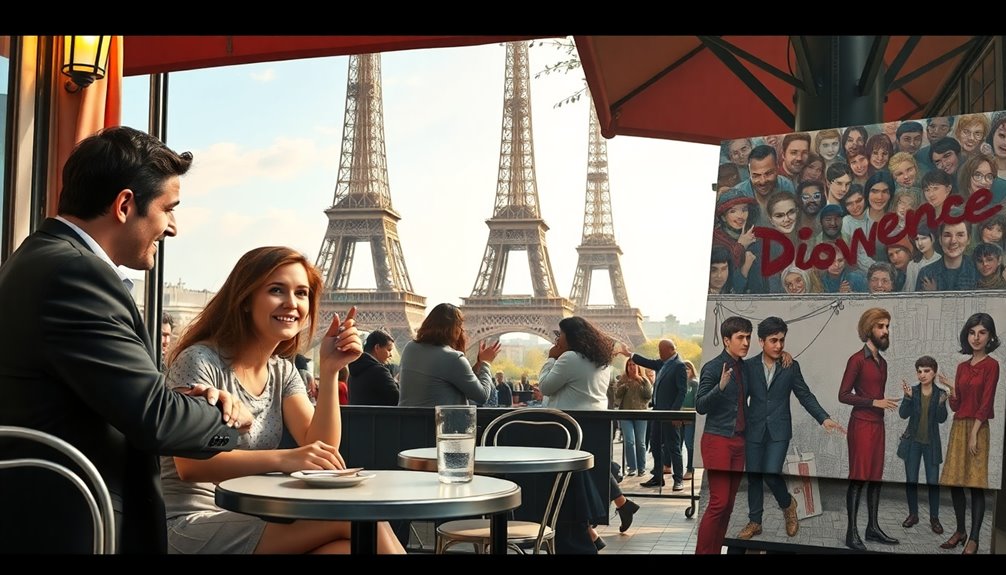"Le Divorce" offers a witty exploration of love and cultural clashes in Paris, showcasing the humorous contrasts between American directness and French subtlety. You follow Isabel Walker, a California girl, as she navigates her step-sister's divorce while grappling with her own emotional turmoil. The novel's observations highlight both societal norms and personal struggles, though some readers find characters one-dimensional. Critics point out uneven pacing and technical flaws in the narrative, yet the humor critiques the complexities of relationships. Discover how this cultural satire unfolds and plays out in both its literary and film adaptations—there's more to uncover in its vibrant world.
Author Background
Diane Johnson, with an impressive background in both fiction and essay writing, is an American novelist known for her sharp wit and keen insights into cultural clashes. Her work often reflects the nuances of expatriate life, particularly for Americans maneuvering the intricacies of living in France. In "Le Divorce," she masterfully illustrates the cultural differences that arise when an American woman immerses herself in French society, blending humor with astute observations. Johnson's literary prowess isn't limited to her novels; she's also penned satirical works that capture the essence of American and French sensibilities. Her ability to juxtapose these cultures reveals deeper truths about identity, belonging, and love. Additionally, her exploration of social issues in her narratives resonates with the themes found in the works of influential writers like Richard Wright. As a finalist for the Pulitzer Prize in 1988 with "Persian Nights," she solidified her reputation as a formidable voice in contemporary literature. Moreover, Johnson's versatility shines through her collaborations on screenplays, including the iconic horror film "The Shining." With a prolific output of 107 books, Diane Johnson continues to contribute considerably to the literary world, making her an essential figure in understanding the complexities of cultural interactions. Her work resonates with the broader theme of the influence of women writers, reflecting their significant contributions to contemporary literature. Johnson's narratives often embody the principle of resilience and inner strength, highlighting how characters navigate the challenges of cross-cultural experiences.
Plot Summary
In "Le Divorce," you follow Isabel Walker, a California girl who ventures to Paris to support her pregnant step-sister, Roxy, amid the chaos of her failing marriage to a French painter.
As you traverse the streets of Paris with Isabel, you witness the stark cultural clash between American and French attitudes towards love and relationships. Roxy's marriage crumbles when her husband leaves her for another woman, thrusting Isabel into the complexities of divorce proceedings that differ vastly from what she knows back home. This scenario mirrors the emotional turmoil experienced by characters in *The Thorn Birds*, illustrating the complexities of love and loyalty within familial relationships. Moreover, the narrative echoes themes of class struggles that resonate with Dickens' portrayal of social realities in his works.
Through Isabel's eyes, you explore the intricacies of expatriate life, where societal expectations weigh heavily on both Roxy and her husband. The dynamics of marriage highlight the importance of communication challenges that arise from differing cultural perspectives on relationships.
The narrative takes on a diary-like structure, capturing the ebb and flow of emotions as Isabel grapples with her sister's turmoil.
However, the story shifts unexpectedly, morphing from a sensitive exploration of personal struggle into a pseudo-thriller format. This transformation leads to a contrived ending that seems disconnected from the rich character development established earlier.
Ultimately, "Le Divorce" presents a witty yet flawed depiction of love, loss, and the challenges of traversing a foreign culture.
Cultural Themes

Cultural themes in "Le Divorce" vividly illustrate the stark contrasts between American and French attitudes toward love and relationships. You immerse yourself in the cultural differences that shape the experiences of the American protagonist, Isabel, as she navigates the complexities of expatriate life in Paris.
The narrative explores how societal norms dictate the approach to divorce, showcasing the challenges Isabel faces when dealing with her step-sister's tumultuous marriage and its implications within a foreign legal system. Systemic discrimination in different cultures can also influence personal relationships in unexpected ways. Additionally, the characters' interactions reveal the unsettling consequences of co-dependent relationships, often leading to emotional turmoil.
Through Isabel's journey, you uncover the nuances of love and vulnerability, while also addressing the impact of greed on personal relationships. The story highlights cross-cultural dynamics, revealing how stereotypes can complicate the understanding of authentic experiences in each culture.
As you read, you'll find that the satirical commentary on lifestyle and values serves as a critical lens, prompting you to question not only the authenticity of cultural representation but also the broader implications for contemporary relationship issues. The exploration of personal struggles and disillusionment in relationships mirrors themes found in other literary works, such as the disintegration of the American Dream illustrated in Richard Yates' "Revolutionary Road."
"Le Divorce" cleverly juxtaposes these themes, inviting you to reflect on how love and societal expectations differ across cultures, ultimately enriching your perspective on relationship dynamics.
Character Analysis
In "Le Divorce," you'll notice Isabel's complexity as she grapples with her stepsister's heartbreak while steering through her own biases. The characters often reflect stereotypes, leading to a dynamic that feels more like a commentary on cultural perceptions than a deep exploration of personal growth. As you read, consider how these emotional disconnects shape their interactions and the overall narrative. The narrative hints at the importance of resilience amidst adversity as characters navigate their relationships in a foreign culture. Additionally, the portrayal of these characters could serve as a reminder of the transformative power of trauma recovery that many individuals experience in their own journeys. In the face of heartbreak and cultural clashes, the characters display inner strength that echoes the resilience found in personal growth memoirs.
Isabel's Complexity and Growth
Isabel Walker's journey in "Le Divorce" reveals the tensions of maneuvering love and family dynamics against the backdrop of Parisian life. As you explore her character, you notice the layers of complexity and the challenges she faces.
- Isabel's practical nature often clashes with her family's sophisticated expectations.
- Critics argue her voice lacks the authenticity you'd expect from a young Californian.
- Her snobbish tendencies showcase her reliance on cultural stereotypes.
- Emotional connections among characters feel superficial, impacting Isabel's growth.
While you might root for Isabel, it's hard to ignore that she remains largely unchanged by her experiences. The tumult of her stepsister's divorce doesn't catalyze significant personal growth.
Instead, she navigates relationships as if she's a "contextualized puppet," with her emotional depth often overshadowed by the family drama.
Isabel's journey highlights the struggle between cultural identity and personal authenticity, revealing a protagonist who grapples with her place in a world that feels both foreign and familiar.
Ultimately, her character embodies the struggle to break free from societal stereotypes, yet she often falls short of achieving true emotional resonance.
Stereotypes and Character Dynamics
Stereotypes play a significant role in shaping the character dynamics in "Le Divorce." The protagonist, Isabel Walker, often projects her own biases onto her French relatives, which not only highlights her snobbish tendencies but also contributes to her overall unlikability. Her view of the French as overly romantic and irresponsible simplifies the cultural clash, reducing complex individuals to mere caricatures.
Secondary characters, like Roxy, are frequently portrayed as one-dimensional, mainly serving as plot devices rather than fully developed individuals. Roxy's struggle with her French husband's infidelity reinforces the stereotype of American women as victims in foreign relationships, lacking emotional depth.
Critics argue that the characters' motivations and behaviors feel inconsistent and shallow, leading to a narrative that lacks authentic emotional connections. This lack of depth leaves the audience with a superficial understanding of the American-French dynamics at play.
Instead of exploring the rich tapestry of cultural differences, the film leans heavily on stereotypes, resulting in a missed opportunity for a more nuanced portrayal of the characters' experiences and interactions. Ultimately, "Le Divorce" presents a cultural clash that feels underdeveloped and reliant on one-dimensional characterizations.
Emotional Disconnect and Depth
How can a narrative feel so emotionally distant despite its focus on love and family? "Le Divorce" struggles to forge authentic connections among its characters, leaving audiences with a sense of detachment. You might find yourself questioning the emotional depth of Isabel Walker, as she often appears shallow and unconvincing. This lack of character growth undermines the potential for genuine family drama.
- Secondary characters like Roxy and Gennie often serve as mere plot devices, lacking real emotional connections.
- Isabel's snobbish tendencies and reliance on stereotypes weaken her authenticity and contribute to the emotional disconnect.
- The motivations driving the characters feel selfish and unlikable, making it hard to invest in their journeys.
- The narrative's shift from a sensitive exploration of divorce to a pseudo-thriller format further dilutes character depth.
Ultimately, the cultural differences portrayed in the film fail to bridge the emotional gaps, leaving you feeling unfulfilled. As you investigate the story, you might wonder why such rich themes of love and family end up feeling so hollow and disconnected.
Writing Style

When you read "Le Divorce," you might notice the narrative perspective shifts can throw you off balance.
The language sometimes feels mismatched with the tone, leading to moments that confuse rather than engage. These issues can impact your overall experience, making it hard to connect with Isabel and her journey in Paris. Additionally, the exploration of strong female leads adds depth to the narrative, offering a contrast to Isabel's character as she navigates cultural differences. This juxtaposition mirrors the resilience of women throughout history, showcasing how they often defy societal expectations.
Narrative Perspective Shifts
Narrative perspective shifts frequently disrupt the flow of "Le Divorce," leaving readers grappling with confusion and inconsistency. You might find yourself lost as the story flips between points of view, creating an uneven pacing that detracts from the overall experience.
- The dialogue often feels disconnected from the character's background.
- Shifts in perspective can lead to moments that drag without meaningful content.
- Critics highlight how these flaws impact reader engagement.
- The writing style struggles to balance humor with literary ambitions.
As you navigate the book, you may notice how the protagonist, Isabel's voice, sometimes feels misaligned with her character's background. This disconnect can pull you out of the narrative, making it challenging to fully immerse yourself in the story.
The technical flaws in the narrative structure contribute to a lack of cohesiveness, leaving you frustrated rather than entertained. While the author aims to create a witty take on love and cultural clashes, the frequent narrative perspective shifts ultimately hinder your enjoyment and understanding of the plot.
As a reader, these inconsistencies might make you question the very essence of the story being told.
Language and Tone Issues
While the writing style of "Le Divorce" aims for a fast-paced charm, it often stumbles over language and tone issues that hinder its effectiveness. You might notice that the dialogue of someone like Isabel feels forced, lacking the authenticity you'd expect from a young Californian. This disconnect can make it hard to connect with the characters made in the story.
Additionally, the advanced vocabulary can alienate readers looking for a more accessible experience, requiring extra effort to keep up. Critics have pointed out that the humor and tone fluctuate throughout the novel, creating confusion about the intended message.
Some passages shine with beautiful writing, but the overall tone often lacks coherence and clarity. This inconsistency can leave you feeling unsure about the story's direction, undermining the charm it aims for. As you read, you may appreciate the author's keen cultural observations but find yourself grappling with the unevenness that distracts from the narrative.
Ultimately, while "Le Divorce" has its merits, its language and tone issues can be a significant hurdle for many readers.
Reception Overview
"Le Divorce" stirred quite the conversation among readers and critics alike, achieving a mixed average rating of 2.96 based on nearly 5,000 ratings. This divide in reader perception reveals several key concerns:
- Many felt the characters were one-dimensional.
- Critics noted uneven pacing and technical flaws in narrative structure.
- Cultural insights on the American-French conflict were criticized as poorly realized.
- Comparisons between the book and its film adaptation often favored the latter.
You might find it interesting that while the narrative attempts to explore cultural conflict, many readers were left feeling uninformed.
The characters often serve as mere plot devices rather than fully developed individuals, which detracts from the depth of the story. The uneven pacing further complicates the reader's experience, making it hard to stay engaged.
When you consider the film adaptation, you'll see that it managed to deliver a more cohesive and engaging experience, leading many readers to prefer it over the book. Additionally, the story's backdrop of Paris mirrors the haunting setting of other iconic narratives, enriching the cultural tapestry explored throughout the text.
Critical Reviews

Amidst the mixed reception of "Le Divorce," critical reviews reveal a stark divide in how readers perceive its characters and thematic execution. While some appreciate the book's fast-paced writing style and beautiful passages, many critics argue that the characters often come across as one-dimensional, lacking the depth necessary for a compelling narrative. This perception suggests that the characters serve primarily as plot devices rather than fully realized individuals.
Moreover, readers express disappointment in the book's cultural insights. They feel that the exploration of American-French differences is poorly executed, relying too heavily on stereotypes instead of offering genuine reflections on the complexities of these cultures. This reliance on clichés undermines the potential richness of the narrative.
In comparing "Le Divorce" with its film adaptation, it's evident that many find the movie superior, further highlighting the book's shortcomings. The uneven pacing and inconsistent perspective shifts detract from the overall experience, leading to a sense of dissatisfaction among readers.
Ultimately, critical reviews underscore the challenges the book faces in delivering a cohesive and engaging narrative that resonates with its audience.
Comparing Book and Film
When you compare Diane Johnson's novel "Le Divorce" to James Ivory's film adaptation, you'll notice significant differences in narrative structure and character development.
The book's uneven pacing and underdeveloped characters stand in stark contrast to the film's engaging performances and cohesive storytelling.
Additionally, the cultural insights presented in the book feel less impactful than the film's vibrant portrayal of American-French relationships.
Narrative Structure Differences
The narrative structure of "Le Divorce" reveals striking contrasts between the book and its film adaptation.
- The book resembles a diary, lacking cohesive direction.
- The film streamlines the story, enhancing engagement.
- Cultural observations in the book often miss the mark.
- The film effectively captures American-French cultural conflicts.
In the novel, the narrative structure feels disjointed, leading to uneven pacing and a less satisfying resolution. You might find the book's twists excessive and distracting, which detracts from its earlier strengths.
In contrast, the film opts for a more straightforward and engaging approach, offering a conclusive resolution that resonates with viewers.
Moreover, the book's cultural observations can feel poorly realized, while the film injects clarity and humor into these cultural clashes. You'll notice the comedic elements in the film enhance its pacing, making it a more entertaining experience overall.
While the book's character development, particularly for Isabel, seems shallow and minimal, the film presents her journey in Paris as more dynamic and relatable.
Ultimately, you'll appreciate how the film's cohesive narrative structure elevates the story, making it a delightful exploration of love and cultural differences.
Character Development Disparities
Often, character development in "Le Divorce" starkly contrasts between the book and its film adaptation. In the book, you might find Isabel portrayed as one-dimensional, lacking emotional depth and meaningful growth. She comes off as a shallow protagonist, and her interactions with the vibrant Parisian backdrop feel underwhelming.
In the film, however, Isabel's character is fleshed out with emotional arcs that allow her to engage more authentically with her surroundings and relationships.
The secondary characters, such as Roxanne and Gennie, also suffer in the book; they often serve merely as plot devices without much agency or depth. The film adaptation rectifies this by giving these characters more substantial roles, enhancing their impact on the overall narrative.
You'll notice that the cultural conflicts, which feel poorly realized in the book, are visualized effectively in the film, making them relatable and engaging.
Critics have pointed out that the film's cohesive character development creates a more dynamic and interconnected cast, addressing the shortcomings of the book. This contrast highlights how character depth can profoundly influence audience engagement in both mediums.
Cultural Insights Comparison
Cultural insights in "Le Divorce" reveal a fascinating dichotomy between the book and its film adaptation, showcasing how each medium interprets American and French life.
- The book explores deeper cultural differences with a darker lens.
- The film emphasizes humor and visual storytelling, making it more engaging.
- Readers find the book's narrative uneven, while viewers appreciate the film's coherence.
- Expatriate life is portrayed differently, with the film capturing its charm.
While the novel dives into the complexities of Isabel's experiences, it often feels underdeveloped compared to the film's vibrant portrayal.
The book's darker tone contrasts sharply with the film's lighthearted approach, which enhances its accessibility.
Critics argue that while both adaptations tackle themes of love and divorce, the film excels in character development, presenting a more coherent narrative.
The film's cinematography and charm sometimes overshadow the book's literary merits, leaving some readers yearning for the nuanced social commentary present in the novel.
Ultimately, whether you prefer the intricacies of the book or the lively visual storytelling of the film, both versions of "Le Divorce" offer valuable insights into the cultural clash between American and French life.
Cultural Commentary

Steering love and relationships in "Le Divorce" reveals the stark contrasts between American and French social norms, inviting readers to reflect on their own experiences.
You see the cultural differences unfold as American characters navigate the complexities of expatriate life in Paris, grappling with issues that challenge their identity. The narrative critiques the French legal system, especially regarding divorce, showcasing the hurdles foreigners face in a system that often feels foreign itself.
As you explore deeper, you'll notice the portrayal of American and French characters often leans into stereotypes, igniting discussions about authenticity in cultural representation. This approach can shape your perceptions, making you question how these portrayals align with or diverge from reality.
Greed and materialism weave through both cultures, raising questions about how societal expectations affect personal relationships. The story ultimately serves as a mirror, reflecting not just cultural clashes but also the universal quest for love and connection amidst shifting social norms.
Whether you're an expatriate or just someone intrigued by cross-cultural dynamics, the commentary in "Le Divorce" resonates, prompting introspection about your own experiences with identity and love in a diverse world.
Humor and Satire
Humor and satire serve as powerful tools in "Le Divorce," allowing readers to navigate the often bewildering landscape of cultural clashes between Americans and the French. The protagonist, Isabel, finds herself caught in a whirlwind of misunderstandings that highlight the absurdities of societal norms on both sides of the Atlantic. Through her witty dialogue and keen observations, you'll laugh while reflecting on deeper themes.
- Misinterpretations of French elegance lead to comedic chaos.
- The stark contrast between American directness and French subtlety creates hilarious moments.
- Characters reveal their vulnerabilities amidst cultural misunderstandings.
- Satirical commentary on expatriate life invites introspection about foreign experiences.
The novel's humor isn't just for entertainment; it critiques the complexities of relationships and personal choices. While maintaining a lighthearted tone, it also reveals darker themes of greed and disillusionment, juxtaposing laughter with sobering realities.
As you immerse yourself in Isabel's journey, you'll appreciate how humor and satire shine a light on the quirks of cross-cultural interactions, making "Le Divorce" a witty exploration of love, life, and the challenges of embracing a new culture.
Personal Reflections

Reading "Le Divorce" often leaves you with mixed feelings about the characters and their journeys. You might appreciate the character authenticity, but you could also feel frustrated by the protagonist's lack of growth. This contrast invites personal reflections on how expatriate life can shape our expectations, especially in the context of American-French relationship dynamics.
The book's cultural commentary showcases the complexities involved, making you think deeply about the nuances of love and identity abroad.
As you navigate the narrative, you may find the humor and satire hit or miss. Some moments feel insightful, while others come off as superficial, leaving you questioning their effectiveness. You might resonate with the humor, yet feel it doesn't always serve the story's depth.
Then there's the ending, which many readers deem contrived. This resolution can feel unsatisfying, overshadowing the strength of the earlier narrative and leaving you yearning for more.
Ultimately, your personal insights into "Le Divorce" reflect a broad spectrum of expectations and interpretations, revealing the intricate tapestry of human experiences woven throughout the story.
Influence of Paris
The enchantment of Paris serves as more than just a picturesque setting in "Le Divorce"; it becomes a character in its own right, shaping the narrative and the lives of the protagonists.
You'll find that the city's vibrant atmosphere accentuates the cultural differences between Americans and the French, emphasizing love and societal expectations.
- The romantic allure of Paris contrasts with the struggles of expatriate life.
- Isabel's experiences reveal the complexities of the French legal system.
- The narrative showcases cultural norms governing relationships and marriage.
- The characters' interactions highlight the city's unique social dynamics.
As you follow Isabel's journey, you're invited to explore the intersection of identity and self-discovery amidst these cultural clashes.
The book captures how living in Paris not only challenges her perceptions but also transforms her understanding of herself.
Here, the city isn't merely a backdrop; it's a catalyst that drives the characters to confront their beliefs and navigate the intricacies of their new lives.
In this way, Paris embodies the charm and challenges of expatriate existence, ultimately shaping the course of love and self-discovery for Isabel and those around her.
Reader Engagement

When you read "Le Divorce," you might find yourself wrestling with its cultural perspectives.
Some parts resonate while others leave you questioning the characters' authenticity and relatability.
How do these contrasting experiences shape your view of American and French lifestyles?
Cultural Perspectives Exchange
Maneuvering the cultural divide between American and French lifestyles can feel like walking a tightrope, especially as you plunge into the experiences of Isabel in "Le Divorce." You might find yourself chuckling at the humorous misunderstandings that unfold, but there's a deeper invitation here to reflect on your own cultural biases.
Consider these aspects as you navigate the story:
- The impact of societal norms on relationships
- Differences in communication styles between cultures
- How humor and satire reveal cultural clashes
- Your own assumptions about expatriate life
Isabel's journey highlights the complexities of love and family dynamics, showcasing both vulnerability and greed in cross-cultural interactions.
While the novel's portrayal of cultural differences may seem superficial at times, it still sparks crucial conversations about misunderstandings that arise from distinct societal norms.
As you laugh at Isabel's misadventures, take a moment to evaluate how your own cultural biases might color your perceptions.
"Le Divorce" serves as a reminder that beneath the humor lies a rich tapestry of communication challenges, inviting you to engage with the nuances of international relationships and perhaps gain a fresh perspective on your own experiences.
Character Relatability Issues
Maneuvering cultural differences in "Le Divorce" can be amusing, but many readers struggle to connect with the characters who populate this world.
You might find that Isabel Walker, the protagonist, feels unconvincing and one-dimensional, as her dialogue and actions don't resonate with the expected voice of a young Californian. This lack of authenticity can create a frustrating disconnect.
Secondary characters like Isabel's stepsister, Roxanne, also suffer from a lack of depth, leaving you feeling emotionally detached from their journeys.
The reliance on stereotypes to portray cultural differences further diminishes the relatability of both American and French characters. Instead of offering genuine insights into their lives, these stereotypes reduce them to mere plot devices.
Recommendations
If you're intrigued by the cultural nuances of expatriate life and the complexities of international relationships, "Le Divorce" is a must-read. This book deftly explores the amusing and often perplexing American-French cultural clashes, making it a delightful journey through the quirks of love and societal norms.
- Enjoy witty literary satire that highlights the humor in everyday misunderstandings.
- Gain insight into the challenges of maneuvering love and divorce in a foreign land.
- Discover the intricate character dynamics that illustrate the differences between American and French perspectives.
- Consider watching the film adaptation for a different take on the story that some viewers find more engaging.
While opinions on character development vary, the book's sharp observations and humor make it a worthwhile read for anyone interested in the expatriate life.
You'll appreciate its exploration of cultural differences and the emotional complexities that come with them.
Whether you're a fan of witty prose or seeking to understand the intricacies of international relationships, "Le Divorce" offers a compelling narrative that resonates with the challenges of love and vulnerability in a foreign context.
Final Thoughts

While many readers appreciate the witty observations and cultural satire in "Le Divorce," the overall experience can feel uneven. The novel explores cultural clashes between Americans and the French through Isabel Walker's adventures in Paris, highlighting misunderstandings that arise in relationships and societal norms.
However, the narrative struggles with pacing and character development, which can leave you wanting more depth in the characters and their journeys. As Isabel navigates the complexities of expatriate life, including the intricacies of divorce and the French legal system, her journey of self-discovery is compelling yet sometimes overshadowed by the book's shortcomings.
The comedic elements and cultural critiques are charming, but they often lack the substance that could elevate the narrative. Interestingly, the film adaptation of "Le Divorce" has garnered more appreciation from audiences, suggesting that the book's narrative issues didn't translate into a cohesive story.
In the end, while the book offers insightful cultural commentary and humorous moments, it ultimately leaves you craving a more engaging and well-rounded narrative that fully captures the essence of its themes.
Conclusion
In "Le Divorce," you're reminded that love isn't just about passion; it's a dance of cultures and misunderstandings. As the characters navigate their differences, you can't help but wonder—can love truly bridge the gap between worlds? With Paris as a vibrant backdrop, the witty exchanges and cultural clashes make you reflect on your own relationships. So, whether you're a romantic at heart or a skeptic, this tale invites you to explore love's complexities.



